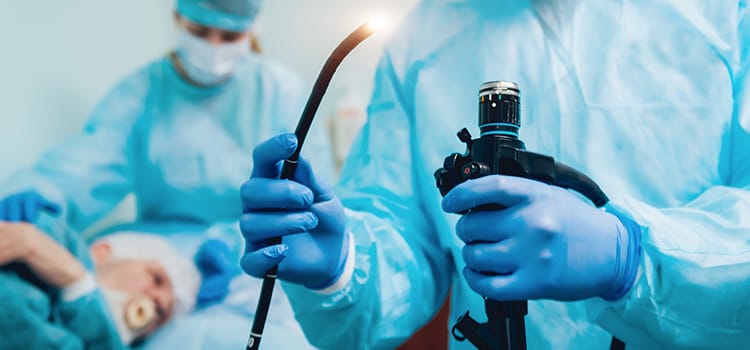Colonoscopy

What Is a Colonoscopy?
Colonoscopy is a procedure which enables the direct visualization of the lining of your colon (large intestine). A thin, flexible tube called a colonoscope, which has its own lens and light source, is inserted into the anus and slowly advanced from the rectum to the cecum (the anatomic beginning of the colon). Lesions such as polyps and colon cancer, and inflammation can be found during a colonoscopy. Biopsies can be obtained, and most polyps can be removed during a colonoscopy.
What Preparation Is Required?
The preparation involves going on a clear liquid diet for 24 hours prior to the procedure. In addition, a laxative preparation is taken the night before and again approximately five hours prior to the procedure. Recent research has shown that split dosing leads to a better visualization of the colon. The colon must be completely clean for the procedure to be accurate and complete, so it is important to follow the instructions carefully. More specific instructions will be given to you when you schedule a colonoscopy. Please refer to our Procedure Instructions section in our website for more details.
Can I Take My Current Medications?
Most medications can be continued as usual, but some medications can interfere with the preparation or the examination. Inform us about medications you’re taking, particularly aspirin products, arthritis medications, anticoagulants (blood thinners), insulin or iron products.
What Happens During Colonoscopy?
In most cases, a colonoscopy is very well-tolerated and the vast majority of patients are comfortable and pain-free after the procedure. You will be given a sedative by our anesthesiologist who will be present to monitor your vital signs during the examination.
You will lie on your side or back during the procedure. The procedure itself usually lasts approximately 20 minutes, although you should plan on one to two hours for waiting, preparation, and recovery.
In some cases, the colonoscopy may not be completed due to a variation in the person’s colon anatomy and/or concern for a higher risk of a perforation. In such cases, an alternative test such as a CT colonography (virtual colonoscopy) may be recommended to visualize the portions of the colon which were not visualized during the colonoscopy.
What If the Colonoscopy Shows Something Abnormal?
If an area needs further evaluation, a biopsy may be obtained. If polyps are found during colonoscopy, they will most likely be removed during the examination.
What Are Polyps and Why Are They Removed?
Polyps are abnormal growths in the colon lining that are usually benign (noncancerous). They vary in size from a tiny dot to several inches. Because cancer begins in polyps, removing them is an important means of preventing colorectal cancer.
How Are Polyps Removed?
Tiny polyps may be destroyed by fulguration (burning) or by removing them with wire loops called snares or with biopsy instruments. A technique called “snare polypectomy” is used to remove larger polyps. This technique involves passing a wire loop through the colonoscope and removing the polyp from the intestinal wall using an electrical current. You should feel no pain during the polypectomy.
What Happens after a Colonoscopy?
The results of the examination will be discussed with you. If a biopsy was taken or a polyp was removed, the material is sent to a pathology lab. You will be contacted by your gastroenterologist to review these results (typically within two weeks).
You will not be allowed to drive for 12 hours. You will need to arrange for someone to escort you home from our office. Even if you feel alert after the procedure, your judgment and reflexes could be impaired for the rest of the day. You may have some cramping or bloating because of air that is introduced into the colon during the examination. This should disappear quickly when you pass gas. You should be able to eat after the examination.
What Are the Possible Complications of Colonoscopy?
In general, colonoscopy is a very safe procedure. However, while uncommon, possible complications include but are not limited to bleeding, infection, perforation or tear that could require surgery, missing a polyp or cancer, or a reaction to sedation. Although complications after colonoscopy are uncommon, it’s important to recognize early signs of possible complications. Contact your physician immediately if you notice severe abdominal pain, fever and chills, or rectal bleeding.
For more information about Liberty Endoscopy Center please call 646.215.2244, or book an online appointment for a consultation at any time.

